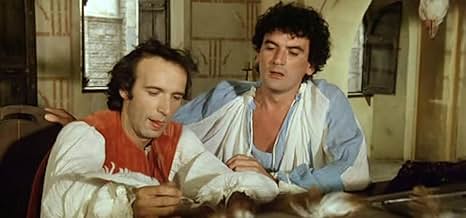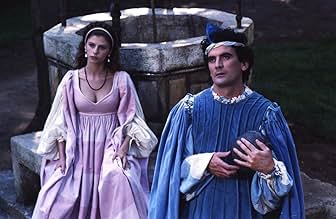Non ci resta che piangere
- 1984
- 1 Std. 53 Min.
IMDb-BEWERTUNG
7,6/10
7582
IHRE BEWERTUNG
Füge eine Handlung in deiner Sprache hinzuIn the 80s, two friends misteriously wake up in the XV century and clumsly try to intermingle with the society of the time.In the 80s, two friends misteriously wake up in the XV century and clumsly try to intermingle with the society of the time.In the 80s, two friends misteriously wake up in the XV century and clumsly try to intermingle with the society of the time.
- Auszeichnungen
- 1 Nominierung insgesamt
Empfohlene Bewertungen
I like the Italians, most of all, but I do not like Massimo Troisi and Roberto Benigni, for me are the most annoying actors ever. Troisi, you do not understand what he says, in all the films he speaks in a kind of dialect that only he understands. In all the movies is the same, boring at the top. You got to have a great deal of steel patience and great love for cinema to watch this movie in its entirety. Troisi and Benigni, who are also directing, are not genius and are not funny at all.
Non ci resta che piangere is an amazing movie. The plot may seem a bit improvised, but that movie is much more than just an excuse for some hilarious gags. It contains all the philosophy of Benigni and Troisi, and presents all the different aspects and approach to life of Neapolitans and fiorentini personalities, away from stereotypes (as usual!). It is one of the funniest movies ever, and still, it makes me cry (maybe because I can't help thinking about Troisi, Napoli's best artist of the late XX century). It is a movie many people should see, but when I travel overseas I find it almost impossible to find in rental shops, or wherever.
The comedy is not bad, but I wouldn't call it a good one, whatever you say. Maybe I missed something, while trying to follow the Naples and Toscany accents and reading subtitles in proper Italian (that weren't word for word translations), but it seemed really average to me.
The humor is unequal, though, some things are really funny, while most of the movie felt boring. The low budget Italian film feeling also didn't help, reminding me of those horrible "Princess dresses in boy's clothes and saves her magical cardboard kingdom" films, if you know what I mean.
The movie was recommended by an Italian friend of mine, and he is not stupid, so maybe being Italian helps a lot with this film.
The humor is unequal, though, some things are really funny, while most of the movie felt boring. The low budget Italian film feeling also didn't help, reminding me of those horrible "Princess dresses in boy's clothes and saves her magical cardboard kingdom" films, if you know what I mean.
The movie was recommended by an Italian friend of mine, and he is not stupid, so maybe being Italian helps a lot with this film.
Roberto Benigni and Massimo Troisi are two of the most important Italian comedians of their generation, who ended up being recognized internationally with their masterpieces, "La vita è bella" by Benigni (1997) and "Il Postino" by Troisi (1994), the latter consecrated after his death.
Until they reached the pinnacle of their careers, they went through a series of films where, assuming the role of comedians, they made funny comedies, but of limited content. It's a bit the fate of comedians, to make the public laugh until they finally get autonomy and courage to make a serious comedy, where the laughter is poetic and the wit is intelligent. These two ended up making it and getting the right recognition, which doesn't always happen.
In this four-hand project, the script is weak and even the comedy, with some amusing moments, relies more on the improvisation capacity of the two actors than on situations or previously written dialogues. Above all, it is worth by the natural grace of these two clowns, of unique quality, who are always a pleasure to see perform.
Until they reached the pinnacle of their careers, they went through a series of films where, assuming the role of comedians, they made funny comedies, but of limited content. It's a bit the fate of comedians, to make the public laugh until they finally get autonomy and courage to make a serious comedy, where the laughter is poetic and the wit is intelligent. These two ended up making it and getting the right recognition, which doesn't always happen.
In this four-hand project, the script is weak and even the comedy, with some amusing moments, relies more on the improvisation capacity of the two actors than on situations or previously written dialogues. Above all, it is worth by the natural grace of these two clowns, of unique quality, who are always a pleasure to see perform.
"Non ci resta che piangere" is definitely a piece of art, directed by two of the most important Italian comedy writers: Benigni and Troisi. This is the work of a Napolitan and a Tuscan comic put together to make a film that'll make you laugh from its start and if you start, you'll never stop.
The plot is very simple: Mario and Saverio, a teacher and a janitor in an elementary school, find them in the year 1492 and it is the origin of all the funny situations you'll find in the movie.
The language used by Mario and Saverio is Italian, but Mario uses a typical Naples accent and Saverio it's using his Tuscan influence, so the language they use is crucial to the final meaning of the movie.
In the original version there was an additional scene, that the directors had to cut off when publishing the movie, despite this the movie is still very funny, and is its freshness, its lack of bad words what makes it a good comedy and a good film.
Ending, I think this movie is one of the best ever produced in Italy, but unfortunately, due to its dialectal language and the direct speech it can't be translated to other languages.
The plot is very simple: Mario and Saverio, a teacher and a janitor in an elementary school, find them in the year 1492 and it is the origin of all the funny situations you'll find in the movie.
The language used by Mario and Saverio is Italian, but Mario uses a typical Naples accent and Saverio it's using his Tuscan influence, so the language they use is crucial to the final meaning of the movie.
In the original version there was an additional scene, that the directors had to cut off when publishing the movie, despite this the movie is still very funny, and is its freshness, its lack of bad words what makes it a good comedy and a good film.
Ending, I think this movie is one of the best ever produced in Italy, but unfortunately, due to its dialectal language and the direct speech it can't be translated to other languages.
Wusstest du schon
- WissenswertesThe screenplay is the main guideline for the film but many dialogues were improvised by Troisi and Benigni.
- Zitate
[last lines]
Saverio: Look! A train! I told you we would return to the present!
Mario: I'm not marrying Gabriellina!
Saverio: Oh yes you are!
Leonardo da Vinci: Engineers! TRAIN!
Leonardo da Vinci: For God's sake! 33%... 33%... and 33%...
[cut to a shot of the train and freeze as the film ends]
- VerbindungenEdited into Bellissimo: Immagini del cinema italiano (1985)
- SoundtracksNel blu dipinto di blu
Written by Domenico Modugno and Franco Migliacci
Top-Auswahl
Melde dich zum Bewerten an und greife auf die Watchlist für personalisierte Empfehlungen zu.
- How long is Nothing Left to Do but Cry?Powered by Alexa
Details
Zu dieser Seite beitragen
Bearbeitung vorschlagen oder fehlenden Inhalt hinzufügen

Oberste Lücke
By what name was Non ci resta che piangere (1984) officially released in Canada in English?
Antwort























